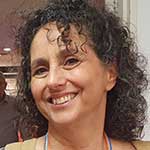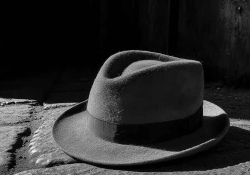Out of the Shadows

Lilach Galil’s 2009 novel, Betsilo (In its shadow), is a polyphonic novel told by the six main characters. Rona is a poet and a literary editor whose father, Michael, died when she was a child. Reading a memoir by a Holocaust survivor, Mr. Zimmerman, she feels that something is amiss and makes an appointment to meet with him. The excerpt is a description of their meeting. Unbeknownst to her, her boyfriend Idan is Eliezer’s grandson.
This excerpt is at the core of the book. It speaks of “the love that dare not speak its name” between gay Jewish men in the Holocaust. The eponymous shadow cast by that story follows the novel’s characters living in the 2000s. These days, when war crimes and ethnic cleansing are taking place, it is a reminder of what keeps us humans alive and makes life worth living.
I remember to take a breath and calm down, right there in front of Mr. Zimmerman’s shifty eyes. I say: I’m sorry to bother you, but may I have some sugar for my tea?
Yes. He gets up and again clicks on the floor with his steps, on his way to the kitchen. Rona, you have to pull yourself together, what’s going on with you? Why does this darkened room, this gloomy man, makes you feel so feeble?
Mr. Zimmerman returns with an old, blackened silver sugar bowl, placing it on the table in front of me. He lays down a small teaspoon, then sits back in his narrow armchair, the same way he sat there before.
Thank you. I take the teaspoon carefully, remove the lid, add sugar to my tea, stir it. I sip it, take a deep breath, recover. I’m not going to fall apart here, in front of this man, Mr. Zimmerman, and I do go on after a while and another deep breath. This time I am more decisive: I wanted to meet with you to figure out something that’s missing in your story.
This time there is no need to wait for the answer. He replies instantly, adamantly, I have written down everything I had to say.
Look, I reply patiently, with great caution, placing my tea on the table, awakened by this bittersweetness, would you mind if I ask you a few questions about the story?
Mr. Zimmerman does not move. His eyes are piercing my forehead. He says, yes, you can ask whatever you like.
I’m a little surprised, I didn’t think he’d go along with me right away. I take a deep breath and pull the manuscript from my bag quickly before he regrets it. I start turning pages, looking for the places I’d marked. Here, here, I say, can I read it to you?
Yes, he straightens up, and I start reading instantly:
On January 17, 1945, the last “Appel” (roll call in German), in Monowitz-Buna concentration camp took place. Following the order of the SS commander, Heinrich Himmler, his forces had to evacuate the camp quickly, while destroying all evidence of everything that occurred in it. I stop. Sorry, Mr. Zimmerman, that’s not it. I’ll soon find the part I’m looking for. I skip a few paragraphs, feeling somewhat pressured under his gaze, then go on: The large number of the prisoners who remained in the camp did not allow for a mass shooting . . . it was decided to march them toward Germany and Austria . . . the evacuation was rushed, and was performed in panic . . . very few prisoners managed to escape the march . . . most of those who stayed behind survived.
I stop for a moment, breathing slowly, raising my eyes to him. Now is the time to ask why his sick, exhausted friends didn’t stay behind. I do it cautiously, and he shoots right away, ready for anything: We couldn’t. There was no time.
Efraim was really sick, I dare say, quietly, cautiously.
Yes. Still. We couldn’t make it. They rushed us outside. By beating us.
I say nothing, lower my head, and go on. In a hurry, I skip some parts: We started our way out running hurriedly . . . we could not stop . . . many collapsed from exhaustion . . . The snow was red with the murdered people’s blood . . . With whatever energy I still had in me, I pulled my friend until Efraim-Mendel fell on the ground and could not get up anymore . . . Eliezer came for my help and together we started dragging him. Get up, we begged. Eliezer cried, but Efraim couldn’t hear us any longer. He lost consciousness.
I pulled my friend until Efraim-Mendel fell on the ground and could not get up anymore . . . Eliezer came for my help and together we started dragging him.
I raise my eyes to look at him. He sits motionlessly in the armchair, his eyes still focused on my forehead, not even blinking. I want to give up. Why do you care so much about it, Rona, take yourself and get out of here. But I continue reading out loud: To stay alive we’d had to keep running, and ignore the shootings. My friend Eliezer looked back, not me. He was the one who saw Efraim getting up and an SS trooper shoots him. It broke Eliezer down. He fell to the ground. I lifted him up with all the strength I could still muster. We kept on walking, forward all the time, I couldn’t feel my arms and legs, it was so cold, and so painful. Those who tried to escape were shot on the spot, and only very few managed to sneak away and hide in the thick vegetation and the woods. Who knows if any of them stayed alive.
I stop reading for a moment and peek at Zimmerman who sits still and upright, staring at the air above me. At night we stopped in a big barn by one of the villages on the way. We lay down on the straw, wet and exhausted. I was in good shape compared to the others, because my shoes were still whole, and my feet were wrapped in rags, but Eliezer had no energy. He begged me to leave him and go on, without him. He wanted me to save myself. They will shoot both of us, he cried, you will collapse too. When we woke up with the shouts early in the morning, and were ordered to keep walking, I picked up Eliezer and carried him on my back.
I stop again, breathe, raise my head and scan his shriveled body, wondering how he managed to carry his friend. I carried him like that for a few miles, until we reached a train station and they loaded us into open cars, so we traveled for days, with no food or water, we drank the snow that fell on us. Until we arrived in Germany, and stopped at Buchenwald. I kept carrying Eliezer with me there too, so he’d stand upright, lift his head, so they don’t see he’s about to fall down and kill him on the spot. It was relatively easy to hide there. There were perhaps a thousand prisoners in one block, the concentration camp barracks, but the hunger was unbearable. We never knew when we’d get food. I pulled a few strings to survive, and I cut the line to get some soup. I had to do everything I could because I was taking care of two now.
I raise my eyes. Mr. Zimmerman still sits in his armchair in the same position. I swallow hard. How can I ask anything now, what made me think I could penetrate into this story, pry and poke at something that does not belong to me. Still, I dare, asking cautiously, almost whispering, I just wanted to know, Mr. Zimmerman, how did you manage to care for your friend, carrying him on your back, feed him. You need an immense amount of strength to do that, and you must have been very weak yourself.
Mr. Zimmerman listens to me, and his eyes wander to me. It’s getting dark outside, but he has no intention of turning on the light. The darkness does not seem to bother him. On the contrary, it rejuvenates him. I had the strength, he says to me, because I had no choice.
I nod slowly. He doesn’t crack, still as tense as he was. Shlomo Zimmerman (pseudonym) doesn’t let go. He keeps himself to himself, impenetrable. Maybe that’s the reason I feel I that I have nothing to lose, and I ask: What about Efraim-Mendel? How come, Mr. Zimmerman, that you left your cousin behind but carried your friend? Efraim was the only family you had by then, is that correct? Would you please explain it to me, because I can’t figure it out.
I detect a slight movement in his pupils. A stretched muscle in his temples. A quiver in his forearm. Zimmerman still doesn’t move, but now he’ll throw this insolent, intrusive girl out. Who do you think you are, what chutzpah! I picture him pouncing on his little legs, waving his fists against me, what do you know about what happened there, what have you done in your life to be able to understand this, it’s not something you can understand. Suddenly, all of you, after sixty years, you want to understand. Where have you been? When we came here you wanted to hear nothing about it, you ignored us, poor miserable diasporic survivors, making you and your country look bad with their wounds, who wanted to hear us then? Now, all of a sudden, this new generation, which doesn’t know what it means to starve, comes and pries and asks questions. You can’t understand. There is nothing to understand.
When we came here you wanted to hear nothing about it, you ignored us, poor miserable diasporic survivors, making you and your country look bad with their wounds, who wanted to hear us then?
Had Mr. Zimmerman stood here and yelled at me all of this, I might have felt better. It might have discharged this tension between us. However, he doesn’t do it. For a long time, he sits there frozen in his seat, his external façade does not reveal his inner turmoil. Only his gaze darkens out, and he stares at me forcefully. I can do nothing but stare back. What have you done, Rona, and why?
And then he says to me: I couldn’t have. Three is too many. I couldn’t have saved two more. Only one. When I saw Efraim on the ground, I still could go on. Without Eliezer, I couldn’t have. He was more than family to me.
I swallow. I think I can understand now. I lower my face, looking at the floor, at his shined shoes, his upright knees, his starched white shirt, the ironed jacket. He looks at me deeply, bending forward, and leans his sharp elbows on his knees. Then he asks suddenly: Tell me, are you married?
I’m taken aback by the question: No, I reply.
But do you have someone, a boyfriend, maybe?
Mr. Zimmerman’s lips seem to raise a bit, on their edges. Is it a smirk? His face twitches a little, his thin skin wrinkles. The same quiver in his finger, perhaps in his hand too. He is still looking at me. I must answer.
Yes, I say hesitantly, embarrassed, you can say that, I guess.
He leans back and reaches out, removing his rumpled fedora, revealing a balding head, long and narrow, gray thinning hairs on his sides. He looks much uglier but also much friendlier.
Look, Rona, he says. Surprisingly, he remembers my name. Whose life would you save if you could? Whose? You tell me. Whose life would you save while risking your own? His words are blurted quickly, nudging each other, rushing me into an answer. His eyes scurry, and excitedly, angrily perhaps, his fingers rub against his hat.
I don’t know, I reply baffled. What does he want from me?
Give it a thought, he keeps urging me. Leans forward and sticks his elbows on his knees. I think fast: Who would I really save? I’m not sure I’d be able to save mine, or even want to. Truly, I have nothing to say to him.
He helps me. You need to think this way: My life isn’t worth anything after what I’ve gone through. They broke my spirit, they humiliated me, tortured my body and my soul, so why should I go on? There is no straight answer. It’s all due to a stupid survival mechanism, who needs it? But if you are destined to live, if you have any chance of staying alive, you’d ask yourself: With whom do I want to live this life? That’s what you’d ask yourself. And when you have the answer, you also get strength for this person. A lot of strength.
If you are destined to live, if you have any chance of staying alive, you’d ask yourself: With whom do I want to live this life?
He cleared his throat and whispered, to me and to himself, When you have someone you love, who’s like your twin soul, it’s your life source. But without that person there is no reason to go on, right? He looked at me, perhaps expecting an answer. I nodded, frozen.
You’d have been strong enough to carry your boyfriend and care for him. Life would be useless without him.
I nodded again, trying to picture myself carrying someone on my back. Perhaps he’s right, perhaps if I’d survive such a horror, and see the end, and he, my twin soul, was lying in front of me, between life and death, I wouldn’t go on without him. I blinked, trying to figure out who was lying there. Erez? Amit? Idan? Maybe Michael? For saving Michael I’d do everything, he’s the source of my strength, even when he’s gone. I might have done it for Erez too. Perhaps for Amit, but none of them is here. Except for Idan. Yes. I think I’d save Idan. I’d save him to save myself.
I looked perplexed at Mr. Zimmerman who sat, small and shriveled in his armchair, his face still twisted in the same strange smirk. I gathered the last bit of courage that I managed to muster and asked, Mr. Zimmerman, why won’t you say something about this relationship, between you and your friend, Eliezer? It may answer the question of why you saved him of all people. It must be a moving story, one of a kind, what you two had, the kind of love that didn’t occur there very often, am I right?
The tension has returned instantly to the room. Zimmerman’s face tensed again but in a different manner. His eyes darkened again. His jaw started tremoring nervously. I must have crossed the line now. Listen to me, he said curtly. This love I’m talking about is the kind you can’t tell about, and you can’t write about anywhere, do you understand what I’m saying? I publish this book here so they’d know exactly what happened there. Because every testimony is important. That’s all. What my friend and I had is gone. That’s it. It doesn’t belong here and it’s nobody’s business.
But of course, it belongs here. My voice sounds different, too strong, altered by this new realization. He must tell his story. All of it. He can’t publish this book without telling about their love. Mr. Zimmerman, I went on, ignoring the fact he stood up now, you can’t skip it, I insisted, that’s what kept you alive, and without it, your story, as shocking as it may be, resembles other stories too much.
I am asking you now, he said and stepped forward, I am asking you now to go. I am asking you to leave.
Translation from the Hebrew
Editorial note: From Betsilo (2009; In its shadow). English translation copyright © 2025 by Dana G. Peleg.











